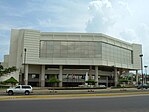Maricaibo
| Maracaibo | ||||||||||
|---|---|---|---|---|---|---|---|---|---|---|
| Municipality | ||||||||||
|
||||||||||
|
||||||||||
| Nickname(s): "La Tierra del Sol Amada" (English: "The Beloved Land of the Sun") |
||||||||||
| Motto: "Muy noble y leal" (English: "Most noble and loyal") |
||||||||||
| Coordinates: 10°39′N 71°38′W / 10.650°N 71.633°WCoordinates: 10°39′N 71°38′W / 10.650°N 71.633°W | ||||||||||
| Country |
|
|||||||||
| State | Zulia | |||||||||
| Municipality | Maracaibo | |||||||||
| Founded | (1) 8 September 1529, (2) 1569, (3) 1574 | |||||||||
| Founded by | Ambrosio Alfínger (1529), Captain Alonso Pacheco (1569), Captain Pedro Maldonado (1574) | |||||||||
| Government | ||||||||||
| • Type | Mayor-council | |||||||||
| • Body | Alcaldía de Maracaibo | |||||||||
| • Mayor | Evelyn Trejo de Rosales (UNT) | |||||||||
| Area | ||||||||||
| • Metro | 1,393 km2 (538 sq mi) | |||||||||
| Elevation | 6 m (20 ft) | |||||||||
| Population (2013) | ||||||||||
| • Rank | 2nd | |||||||||
| • Urban | 2,001,591 | |||||||||
| • Metro | 2,450,559 | |||||||||
| Demonym(s) | Marabino(a), Maracaibero(a), Maracucho(a) | |||||||||
| Time zone | VST (UTC-04:30) | |||||||||
| • Summer (DST) | not observed (UTC-04:30) | |||||||||
| Postal coded | 4001, 4002, 4003, 4004, 4005 | |||||||||
| Area code | 261 | |||||||||
| ISO 3166 code | VE-V | |||||||||
| Website | Alcaldía de Maracaibo (Spanish) | |||||||||
| The area and population figures are for the municipality. | ||||||||||
Maracaibo (Spanish pronunciation: [maɾaˈkai̯βo]) is a city and municipality in northwestern Venezuela, on the western shore of the strait that connects Lake Maracaibo to the Gulf of Venezuela. It is the second-largest city in the country (after the national capital Caracas) and is the capital of the state of Zulia. The population of the city is approximately 1,495,200 with the metropolitan area estimated at 2,108,404 as of 2010[update]. Maracaibo is nicknamed La Tierra del Sol Amada ("The Beloved Land of the Sun").
The name Maracaibo is said to come from the brave cacique (Indian chief) Mara, a young native who valiantly resisted the Spaniards and died fighting them. Legend says that when Mara fell, the Indians shouted "Mara kayó!" (Mara fell!), thus originating the city name --although it would be strange for them to shout in Spanish. Other historians say that the first name of this land in the local language was "Maara-iwo" meaning "Place where serpents abound".
The first indigenous settlements were of Arawak and Carib origin. Around the main group were the Añu tribe who built rows of stilt houses all over the northern riviera of the Lake Maracaibo. The first Europeans arrived in 1499.
The city was founded three times: the first time was during the Klein-Venedig period (1528–1546), when the Welser bankers of Augsburg received a concession over Venezuela Province from Charles I. of Spain. In August 1529 the German Ambrosius Ehinger made his first expedition to Lake Maracaibo which was bitterly opposed by the indigenous Coquivacoa. After winning a series of bloody battles, he founded the settlement on 8 September 1529. Ehinger named the settlement New Nuremberg (German: Neu-Nürnberg) and the lake after the valiant chieftain Mara of the Coquivacoa, who had died in the fighting. The city was renamed Maracaibo after the Spanish took possession. The lack of activity in the zone made Nikolaus Federmann evacuate the village in 1535 and move its population to Santa Marta near the then capital of Venezuela Province, Santa Ana de Coro.
...
Wikipedia











